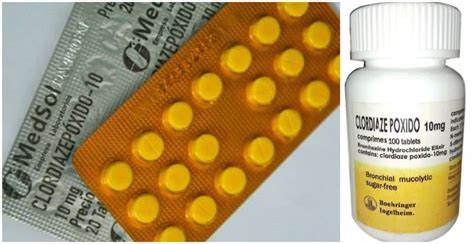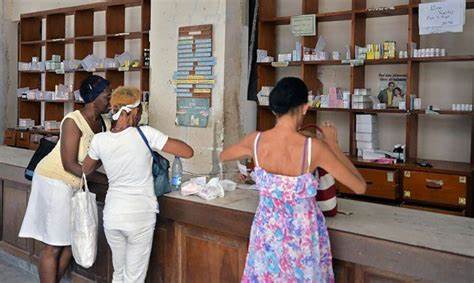
El déficit de medicamentos en Miami y otras ciudades de Florida parecía una situación insólita, pero ya se ha vuelto cotidiana. (14ymedio)
FARMACIAS DE LA FLORIDA EN ESTADOS UNIDOS ABASTECEN DESESPERADA SITUACION MEDICA EN CUBA. PHOTOS.
Las farmacias de Miami abastecen cada vez más a los cubanos de la Isla. Los exiliados recorren la ciudad para conseguir lo que necesitan sus familiares. No hay quien se opere en Cuba sin el dinero de Miami y los sobornos para el personal.
EL VIEJO CHISTE DE EMIGRANTES sobre Miami, última provincia de Cuba, amenaza con volverse realidad. En la gran ciudad de Florida empiezan a escasear algunos medicamentos. “Cuando voy a una farmacia, me dicen que se acabaron las medicinas, que se lo llevaron todo para mandarlo a Cuba”, se queja Enrique, que lleva diez años residiendo en Estados Unidos.
Enrique ha recorrido las farmacias de la ciudad para conformar un paquete de insumos médicos. Su madre lleva un año en tratamientos contra el cáncer de mama y ahora se enfrentará a una operación en Villa Clara. Angustiado, Enrique comprende que la única esperanza de su familia es que él consiga los medicamentos y equipos necesarios, pues, según la advertencia de los médicos locales, “aquí no hay nada”.
Teléfono en mano y manejando por las calles de Miami, el hombre consulta la lista que le han remitido sus parientes. “Cada vez que voy a un establecimiento me dicen lo mismo: ellos saben qué venderme, porque todos los cubanos llegan pidiendo lo mismo, pero ya no hay. La demanda es tanta que incluso aquí las cosas están en déficit”, lamenta Enrique.
PRODUCTOS MEDICOS QUE TERRIBLEMENTE ESCASENA..
“Lo que más ‘perdido’ está”, explica el hombre, “es el hilo para la sutura, los guantes quirúrgicos y la anestesia”. El inventario de Enrique es minucioso. Lo que falta en una farmacia debe “cazarlo” en otra, aunque sea en una ciudad distinta. Para la operación requiere dos tipos de hilo de sutura, más fino para el interior y de otra clase para cerrar la herida. Tendrá que llevar catéteres de calibre 18 o 20, que son los necesarios para recibir transfusiones y sueros.
“Cada vez que voy a un establecimiento me dicen lo mismo: ellos saben qué venderme, porque todos los cubanos llegan pidiendo lo mismo
“Cinco paquetes de torundas de gasa, cuatro vendajes, algodón, 20 compresas, jeringuillas, varios rollos de esparadrapo, dos equipos de suero… y eso es apenas el comienzo”, enumera Enrique. El “cubaneo” médico es tan visible que, si no fuera porque le “consiguieron” el equipo de drenaje Surgivac, no habría modo de comprarlo. “180 dólares me costó”, asegura el hombre, que también pagó una buena cantidad por el anestésico intravenoso Propofol y la povidona yodada.
“Luego vendrá el largo proceso de recuperación”, añade, “para el que mi mamá necesitará más gasa y algodones, una venda elástica con alfileres, un vendaje de mayor tamaño para cubrir el torso y compresas para cada cura”.
Una amiga médico es quien prepara la lista, que luego la madre de Enrique le hace llegar. Son los propios sanitarios cubanos quienes admiten lo que hay y lo que no. “Y cada vez tienen menos. Ya el Gobierno se acostumbró a que nosotros haremos lo que sea para que nuestros familiares se operen. Es sí o sí: ¿quién va a dejar morir a su madre por no enviarle medicamentos?”.
Como Enrique, muchos cubanos residentes en el extranjero se sienten entre la espada y la pared. No cuentan con las vías necesarias para pedir rápidamente la reunificación con sus parientes y tampoco están dispuestos a someterlos al duro viaje por Centroamérica hasta la frontera estadounidense. “Es una situación que desespera”, asegura Enrique.
Fenómenos como “resolver” productos, esperar varias horas para realizar una compra y el maltrato de los farmacéuticos resucitan las peores pesadillas del exilio cubano
Un nuevo mensaje entra al teléfono. Su madre espera su turno en el área oncológica del Hospital Docente Clínico Quirúrgico de Santa Clara. Como el centro se quedó sin agua, una ruidosa pipa bombea el líquido hacia el interior e impide descansar a los pacientes. Los que vienen a tratarse evitan los charcos y cables que inundan la recepción, para que el resbalón no se convierta en fractura de cadera o algo peor.
UNICA SOLUCION POSIBLE…
“La semana que viene salgo para Cuba”, concluye Enrique. “Eso quiere decir que mis maletas no solo llevan los medicamentos y equipos, sino también un par de chancletas para mi mamá, dos batas de casa, ropa para los primos, galletas, conservas, confituras, lo que sea para ‘endulzar’ un poco todo lo que está pasando”.
El déficit de medicamentos en Miami y otras ciudades de Florida parecía una situación insólita, pero ya se ha vuelto cotidiana para los cubanos residentes en Estados Unidos. Fenómenos como “resolver” productos, esperar varias horas para realizar una compra y el maltrato de farmacéuticos y vendedores resucitan las peores pesadillas del exilio cubano. El Gobierno de la Isla, mientras tanto, sigue enarbolando con orgullo, y a través de la exportación de sanitarios, la etiqueta de “potencia médica”.
FLORIDA PHARMACIES IN THE UNITED STATES SUPPLY THE DESPERATE MEDICAL SITUATION IN CUBA. PHOTOS.
Pharmacies in Miami increasingly supply Cubans on the island. Exiles travel through the city to get what their relatives need. There is no one who operates in Cuba without the money from Miami and the bribes for the staff.
THE OLD EMIGRANT JOKE about Miami, Cuba’s last province, threatens to become a reality. In the great city of Florida, some medicines are beginning to be scarce. “When I go to a pharmacy, they tell me that the medicine has run out, that they took everything to send it to Cuba,” complains Enrique, who has lived in the United States for ten years.
Enrique has toured the city’s pharmacies to put together a package of medical supplies. His mother has been undergoing breast cancer treatment for a year and will now face an operation in Villa Clara. Distraught, Enrique realizes that his family’s only hope is for him to get the necessary medicines and equipment, because, according to the local doctors’ warning, “there is nothing here.”
Phone in hand and driving through the streets of Miami, the man consults the list that his relatives have sent him. “Every time I go to an establishment they tell me the same thing: they know what to sell me because all Cubans arrive asking for the same thing, but there is no more. The demand is so great that even here things are in deficit,” laments Enrique.
MEDICAL PRODUCTS ARE TERRIBLY SCARCE…
“What is most ‘lost’,” explains the man, “is the thread for the suture, the surgical gloves, and the anesthesia.” Enrique’s inventory is thorough. What is missing in one pharmacy must be “hunted” in another, even if it is in a different city. For the operation, it requires two types of suture thread, a finer one for the interior and another type to close the wound. He will have to wear 18 or 20-gauge catheters, which are necessary to receive transfusions and serums.
“Every time I go to an establishment they tell me the same thing: they know what to sell me because all Cubans arrive asking for the same thing.
“Five packages of gauze swabs, four bandages, cotton, 20 compresses, syringes, several rolls of tape, two sets of serum… and that’s just the beginning,” Enrique lists. The medical “Cuban” is so visible that if it weren’t for the fact that they “got” the Surgivac drainage kit for him, there would be no way to buy it. “It cost me 180 dollars,” says the man, who also paid a good amount for the intravenous anesthetic Propofol and povidone-iodine.
“Then comes the long recovery process,” he adds, “for which my mom will need more gauze and cotton pads, an elastic bandage with pins, a larger bandage to cover her torso, and compresses for each dressing.”
A doctor friend is the one who prepares the list, which Enrique’s mother then sends to her. It is the Cuban health workers themselves who admit what is there and what is not. “And they have less and less. The government has gotten used to the fact that we will do whatever it takes for our relatives to have surgery. It’s yes or yes: who is going to let his mother die for not sending him medicine?”
Like Enrique, many Cubans living abroad feel between a rock and a hard place. They do not have the necessary means to quickly request reunification with their relatives and they are not willing to subject them to the harsh journey through Central America to the US border. “It’s a desperate situation,” says Enrique.
Phenomena such as “solving” products, waiting several hours to make a purchase, and the mistreatment of pharmacists resurrect the worst nightmares of the Cuban exile.
A new message comes on the phone. His mother awaits her turn in the oncology area of the Santa Clara Clinical-Surgical Teaching Hospital. As the center ran out of water, a noisy pipe pumps the liquid inside and prevents patients from resting. Those who come for treatment avoid the puddles and cables that flood the reception so that the slip does not turn into a hip fracture or something worse.
ONLY POSSIBLE SOLUTION…
“Next week I’m leaving for Cuba,” Enrique concludes. “That means that my bags not only carry the medicines and equipment, but also a pair of flip flops for my mom, two house robes, clothes for the cousins, cookies, preserves, preserves, anything to ‘sweeten’ a little everything that’s going on.”
The shortage of medicines in Miami and other Florida cities seemed like an unusual situation, but it has already become a daily occurrence for Cubans residing in the United States. Phenomena such as “solving” products, waiting several hours to make a purchase, and the mistreatment of pharmacists and vendors resurrect the worst nightmares of Cuban exiles. The Government of the Island, meanwhile, continues to proudly display the label of “medical power” through the export of toilets.
Agencies/ 14yMedio/ Juan Izquierdo, La Habana/ Extractos/ Excerpts/ Internet Photos/ Arnoldo Varona/ www.TheCubanHistory.com
THE CUBAN HISTORY, HOLLYWOOD.



 FARMACIAS de la Florida en EEUU Abastecen la Desesperada Situación Médica de Cuba. PHOTOS. * FLORIDA Pharmacies in the United States Supply the Desperate Medical Situation in Cuba. PHOTOS.
FARMACIAS de la Florida en EEUU Abastecen la Desesperada Situación Médica de Cuba. PHOTOS. * FLORIDA Pharmacies in the United States Supply the Desperate Medical Situation in Cuba. PHOTOS.





